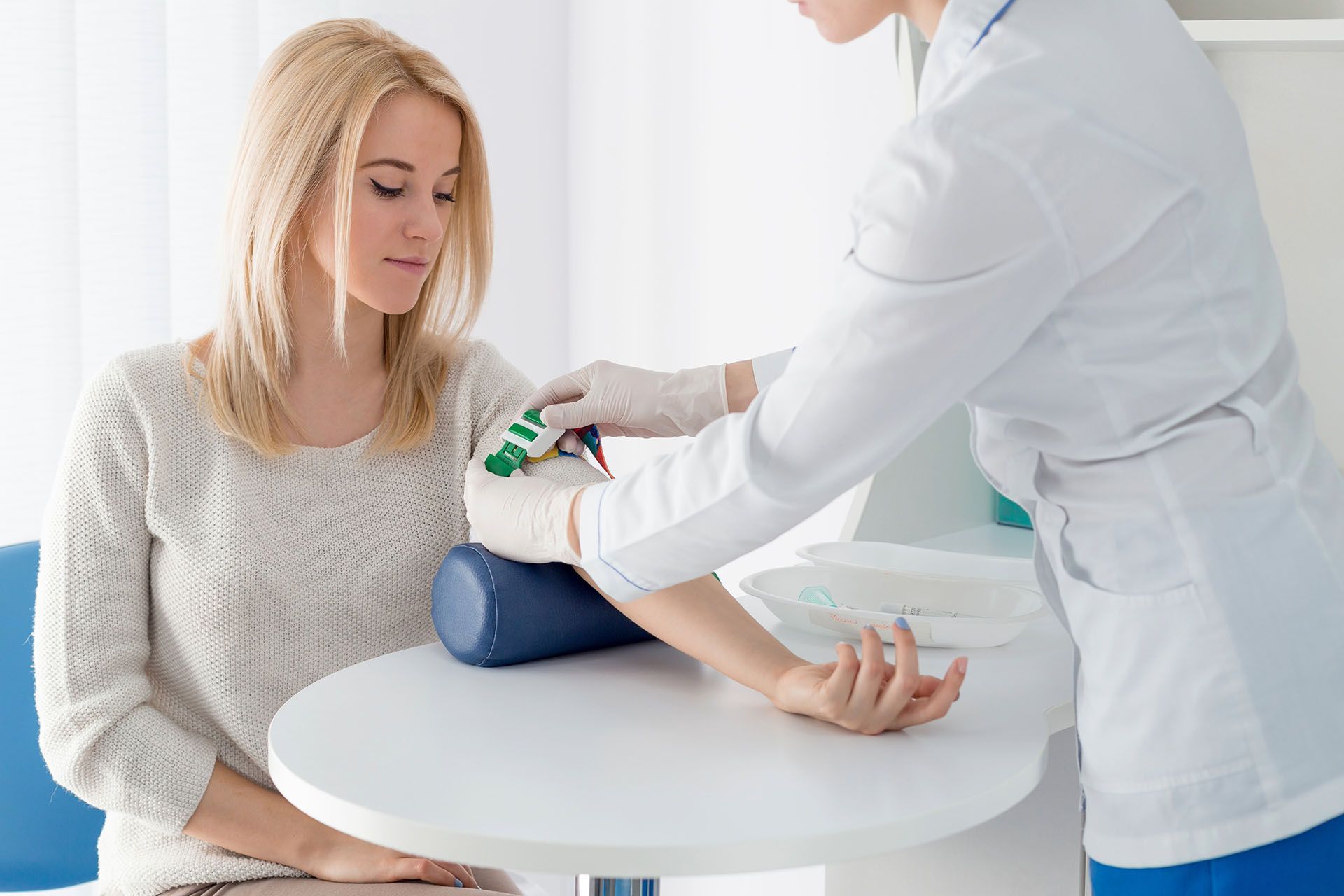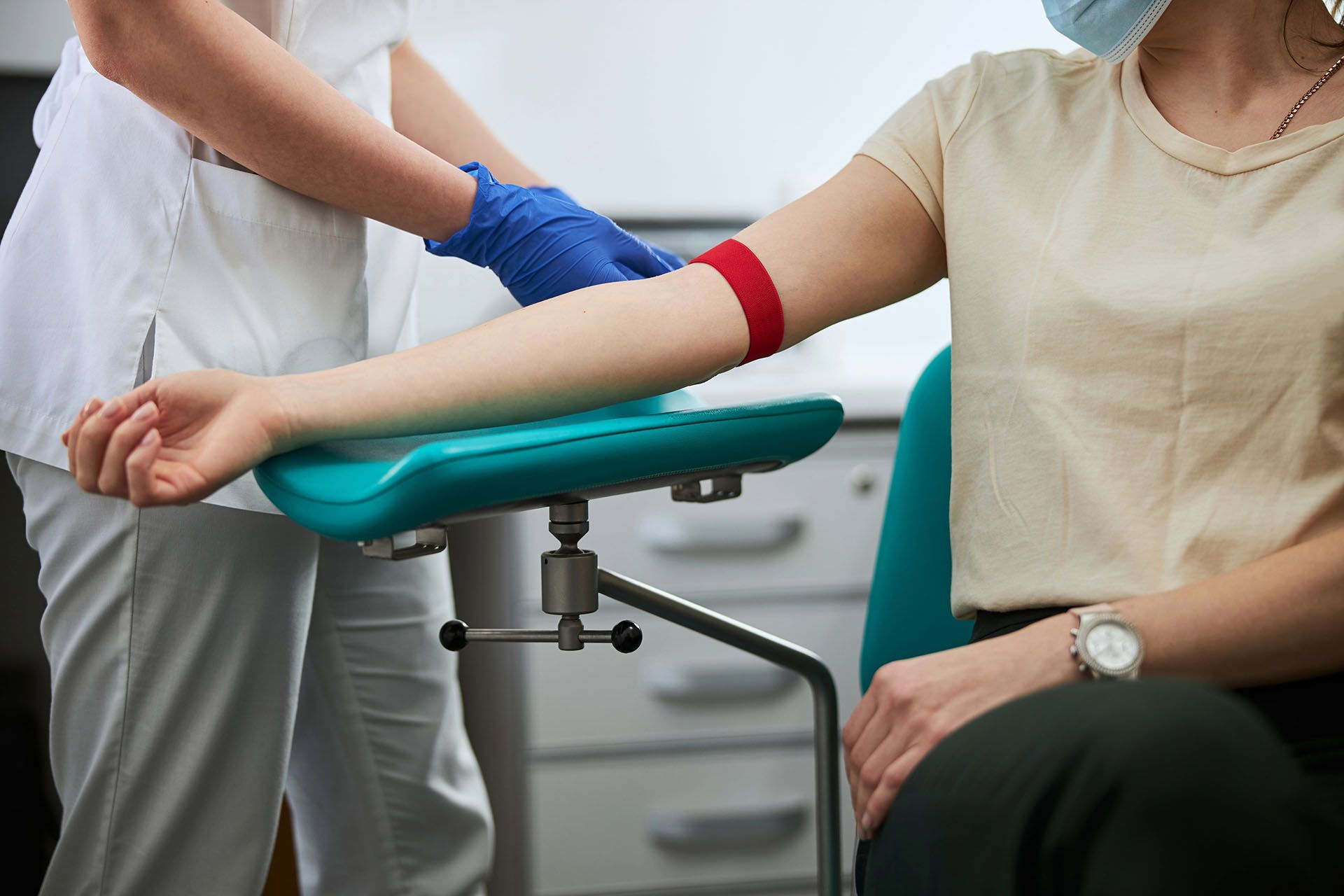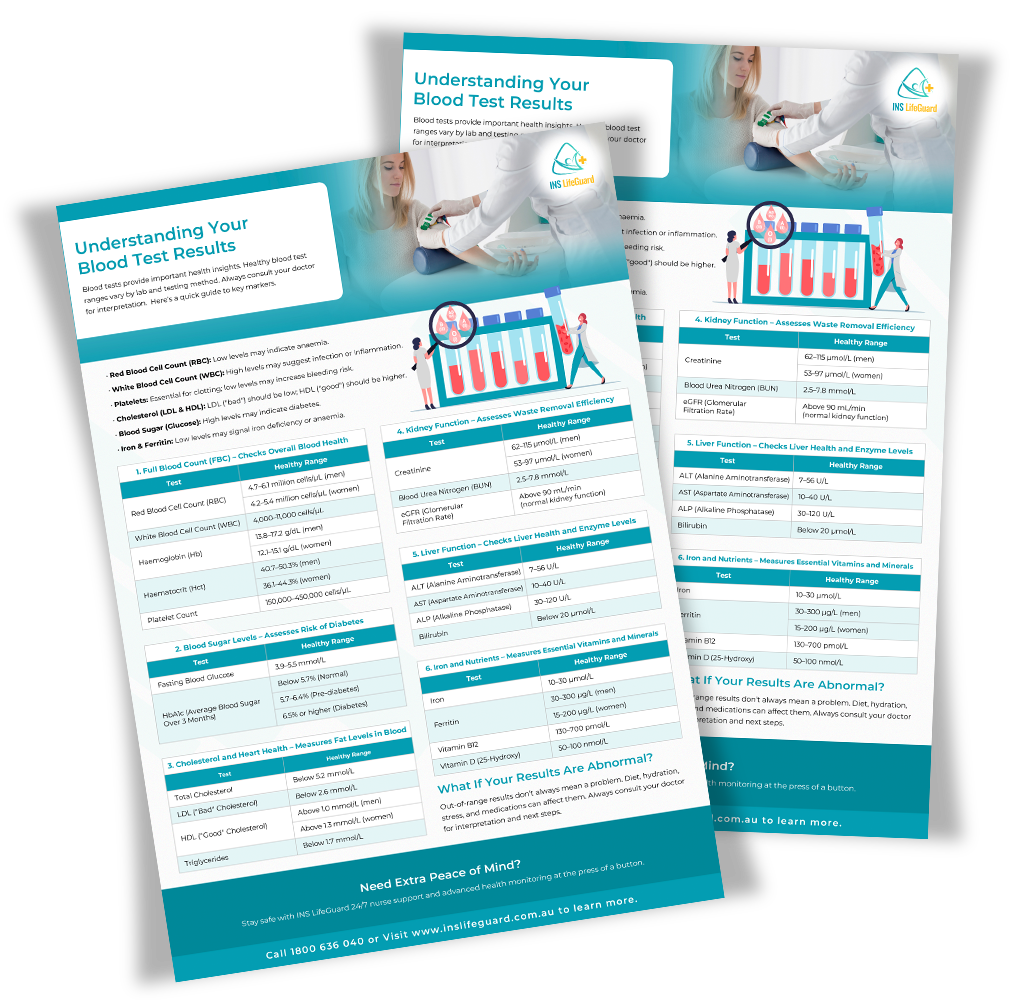INS LifeGuard
Understanding Blood Tests: A Simple Guide to Your Health

Blood tests are one of doctor's most valuable tools to assess overall health and detect potential medical conditions. They provide insights into various aspects of your body, including organ function, nutrient levels, and risk factors for diseases. However, the results can often seem complex, with unfamiliar abbreviations and numbers. When was the last time you had a blood test? Did you fully understand your results?
This blog will explain everything you need to know about blood tests, from what they measure to what you can expect during the process.
Why Regular Blood Tests Are Essential for Preventive Care
Regular blood tests are key to maintaining good health. They help detect medical conditions early, monitor changes over time, and provide valuable insights into overall well-being.
If it has been a while since your last blood test, consider speaking with your doctor about whether you need one. Early detection and preventive care can significantly improve the management of health conditions.
What Can a Blood Test Detect?
A standard blood test can provide important information about your health, including:
General Health and Organ Function
Tests such as a Full Blood Count (FBC) and Comprehensive Metabolic Panel (CMP) assess overall health and check the function of organs like the liver and kidneys.
Nutrient Deficiencies
Blood tests can measure levels of essential nutrients such as iron, vitamin D, and vitamin B12, helping to identify deficiencies that could lead to fatigue, weakness, or other symptoms.
Infections and Inflammation
A high white blood cell count or increased inflammatory markers, such as C-reactive protein (CRP), may indicate an infection or an underlying inflammatory condition.
Diabetes and Blood Sugar Levels
A fasting glucose test or HbA1c test can determine if you have diabetes or prediabetes, allowing for early intervention and management.
Cholesterol and Heart Health
A lipid panel measures cholesterol and triglyceride levels, which are important indicators of heart disease risk.
Thyroid Function
Thyroid function tests, including TSH (Thyroid-Stimulating Hormone), assess whether the thyroid is underactive (hypothyroidism) or overactive (hyperthyroidism).
Hormone Levels
Doctors may check hormone levels such as testosterone, oestrogen, and cortisol for concerns related to reproductive health, stress, or metabolism.
How Often Should You Have a Blood Test?
How frequently you need a blood test depends on age, medical history, and health condition. General recommendations include:
- Routine Health Check: Every one to two years for healthy adults.
- Cholesterol and Heart Health: If you have risk factors, every four to six years or more often.
- Diabetes Screening: Every three years if you are over 40 or at risk.
- Thyroid Function: Every five years for adults, or more often if symptoms are present.
- Iron and Vitamin Levels: As needed, particularly if you experience fatigue, weakness, or other related symptoms.
People with chronic conditions or those on long-term medications may require more frequent testing, as recommended by their doctor.
Are you getting a Blood Test? Here’s What You Should Know First
Whether it's a routine check-up or a specific test ordered by your doctor, understanding the process can help you feel more comfortable and ensure accurate results.
How Much Blood is Taken During a Test?
Many people are concerned about the amount of blood drawn during a test. In most cases, only a small amount is taken—typically a few millilitres, about the size of a teaspoon.
Up to 10–20 millilitres (roughly a tablespoon) may be collected for more extensive testing, such as full health panels. This is generally safe and has no lasting impact on the body.

Fasting Requirements
Specific blood tests require fasting, while others do not. If fasting is required, you should:
- Avoid eating or drinking anything except water for 8 to 12 hours before the test.
- Refrain from alcohol, caffeine, and strenuous exercise the night before.
If you are unsure whether you need to fast, it is best to check with your doctor before your test.
How Are Blood Samples Analysed?
Once your blood is drawn, it is sent to a laboratory for analysis. The testing process involves several steps:
- Separation of Components: The blood is placed in a machine called a centrifuge, which spins it at high speed to separate red blood cells, white blood cells, plasma, and other components.
- Chemical Analysis: Specialised machines measure levels of glucose, cholesterol, hormones, and other key substances.
- Microscopic Examination: A pathologist may examine blood cells under a microscope for abnormalities.
Most standard blood test results are available within 24 to 72 hours, although some specialised tests may take longer.
Blood Test Results: Know Your Numbers
Understanding your blood test results is key to managing your health. Our free reference guide provides normal ranges for common blood markers and helps you know when to follow up with your doctor.
Stay informed, take control of your well-being, and make confident health decisions.

How and Where to Get a Blood Test in Australia
In Australia, blood tests are typically conducted at pathology collection centres, facilities specifically for collecting and processing blood samples.
Where to Get a Blood Test
1. Pathology Collection Centres
Usually, your doctor will direct you to a nearby pathology collection centre. The details, including the address, will be provided on your pathology request form. Major pathology providers run these centres, commonly found in medical centres, hospitals, and dedicated pathology clinics.
2. GP Clinics and Medical Centres
Some general practitioners (GPs) can collect blood samples at their clinics, especially for routine tests. However, not all GP clinics offer this service, so your doctor will let you know if this is an option.
3.Hospitals
If you are already receiving medical treatment in a hospital, blood tests may be done on-site as part of your care. This is common for patients in emergency departments, inpatient wards, or those undergoing specialised treatments.
How to Find a Blood Test Location
- Using Online Health Service Finders: You can search for nearby pathology collection centres, doctors, pharmacies, and hospitals. This can help you locate the most convenient place for your test.
- Ask Your Doctor: Your GP or specialist is the best person to advise you on where to get your blood test. They can provide recommendations and instructions tailored to your specific needs.
If you have any concerns or questions before your test, discussing them with your doctor is always a good idea. Being informed about the process can help you feel more prepared and at ease.
Supporting Your Health with INS LifeGuard
At INS LifeGuard, we go beyond routine check-ups to provide 24/7 access to nurses and healthcare professionals for real-time health monitoring and support. With the INS LifeGuardian® App, you can track vital signs like blood pressure, heart rate, and oxygen levels directly from your Apple Watch or compatible SmartWatch.
Stay informed, stay connected, and have expert care at your fingertips—anytime, anywhere.
Call 1800 636 040 or visit www.inslifeguard.com.au to learn more.

About
INS LifeGuard is the only 24/7 nurse on-call personal and medical monitoring in Australia. We provide monitoring technology for both in the home and on the go and can also monitor other provider's equipment. Our services are suitable for anyone wanting support to stay independent such as the elderly, those with medical conditions and disabilities plus enhancing safety and security for lone workers.
Related Articles

-
Visit our website here
I hope you enjoy reading this blog post
INS LifeGuard is the only nurse on-call personal and medical alarm service in Australia. If you would like more information about INS LifeGuards solutions, visit our website here.
I hope you enjoy reading this blog post.
INS LifeGuard is the only nurse on-call personal and medical alarm service in Australia. If you would like more information about INS LifeGuards solutions, visit our website
here.

INS LifeGuard is the only nurse on-call personal emergency response service in Australia. We have a commitment to healthcare innovation which includes personal alarms and medical alert solutions that make independence easier, safer and more enjoyable.
Our services support Seniors, Carers, Providers, NDIS Participants, Retirement Villages, DVA, Lone Workers and anyone that wants the security that help is a press of a button away.
LATEST POSTS
PO Box 485 Unanderra NSW 2526 Australia
INS LifeGuard
International Enquiries
INS CareCall supplies and monitors emergency response equipment and services, including hardware manufactured by Chiptech, Smart-Caller, SmartLink, and the LifeGuard L-Series Diallers.
Monitoring of alarms is provided through INS LifeGuard's unique Emergency Response Centre, which is the only personal alarm response centre staffed by qualified nurses. This is an important distinction.
Quicklinks
Supporting
PO Box 485 Unanderra NSW 2526 Australia
INS LifeGuard
International Enquiries












